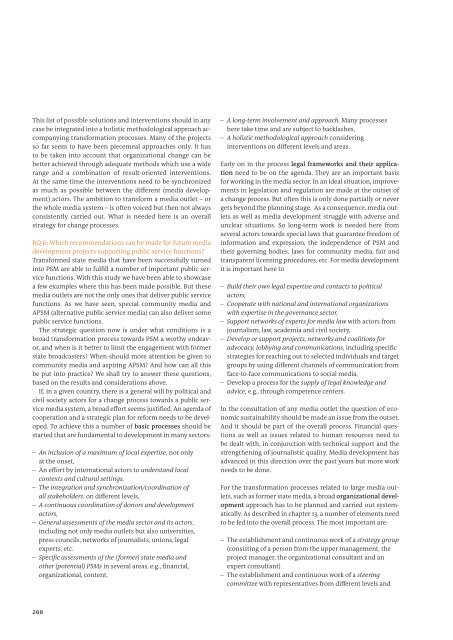edition-dw-akademie-in-the-service-of-the-public-functions-and-transformation-of-media-in-developing-countries-pdf
edition-dw-akademie-in-the-service-of-the-public-functions-and-transformation-of-media-in-developing-countries-pdf
edition-dw-akademie-in-the-service-of-the-public-functions-and-transformation-of-media-in-developing-countries-pdf
Create successful ePaper yourself
Turn your PDF publications into a flip-book with our unique Google optimized e-Paper software.
This list <strong>of</strong> possible solutions <strong>and</strong> <strong>in</strong>terventions should <strong>in</strong> anycase be <strong>in</strong>tegrated <strong>in</strong>to a holistic methodological approach accompany<strong>in</strong>g<strong>transformation</strong> processes. Many <strong>of</strong> <strong>the</strong> projectsso far seem to have been piecemeal approaches only. It hasto be taken <strong>in</strong>to account that organizational change can bebetter achieved through adequate methods which use a widerange <strong>and</strong> a comb<strong>in</strong>ation <strong>of</strong> result-oriented <strong>in</strong>terventions.At <strong>the</strong> same time <strong>the</strong> <strong>in</strong>terventions need to be synchronizedas much as possible between <strong>the</strong> different (<strong>media</strong> development)actors. The ambition to transform a <strong>media</strong> outlet – or<strong>the</strong> whole <strong>media</strong> system – is <strong>of</strong>ten voiced but <strong>the</strong>n not alwaysconsistently carried out. What is needed here is an overallstrategy for change processes.RQ 6: Which recommendations can be made for future <strong>media</strong>development projects support<strong>in</strong>g <strong>public</strong> <strong>service</strong> <strong>functions</strong>?Transformed state <strong>media</strong> that have been successfully turned<strong>in</strong>to PSM are able to fulfill a number <strong>of</strong> important <strong>public</strong> <strong>service</strong><strong>functions</strong>. With this study we have been able to showcasea few examples where this has been made possible. But <strong>the</strong>se<strong>media</strong> outlets are not <strong>the</strong> only ones that deliver <strong>public</strong> <strong>service</strong><strong>functions</strong>. As we have seen, special community <strong>media</strong> <strong>and</strong>APSM (alternative <strong>public</strong> <strong>service</strong> <strong>media</strong>) can also deliver some<strong>public</strong> <strong>service</strong> <strong>functions</strong>.The strategic question now is under what conditions is abroad <strong>transformation</strong> process towards PSM a worthy endeavor,<strong>and</strong> when is it better to limit <strong>the</strong> engagement with formerstate broadcasters? When should more attention be given tocommunity <strong>media</strong> <strong>and</strong> aspir<strong>in</strong>g APSM? And how can all thisbe put <strong>in</strong>to practice? We shall try to answer <strong>the</strong>se questions,based on <strong>the</strong> results <strong>and</strong> considerations above.If, <strong>in</strong> a given country, <strong>the</strong>re is a general will by political <strong>and</strong>civil society actors for a change process towards a <strong>public</strong> <strong>service</strong><strong>media</strong> system, a broad effort seems justified. An agenda <strong>of</strong>cooperation <strong>and</strong> a strategic plan for reform needs to be developed.To achieve this a number <strong>of</strong> basic processes should bestarted that are fundamental to development <strong>in</strong> many sectors:– An <strong>in</strong>clusion <strong>of</strong> a maximum <strong>of</strong> local expertise, not onlyat <strong>the</strong> onset,– An effort by <strong>in</strong>ternational actors to underst<strong>and</strong> localcontexts <strong>and</strong> cultural sett<strong>in</strong>gs,– The <strong>in</strong>tegration <strong>and</strong> synchronization/coord<strong>in</strong>ation <strong>of</strong>all stakeholders, on different levels,– A cont<strong>in</strong>uous coord<strong>in</strong>ation <strong>of</strong> donors <strong>and</strong> developmentactors,– General assessments <strong>of</strong> <strong>the</strong> <strong>media</strong> sector <strong>and</strong> its actors,<strong>in</strong>clud<strong>in</strong>g not only <strong>media</strong> outlets but also universities,press councils, networks <strong>of</strong> journalists, unions, legalexperts, etc.– Specific assessments <strong>of</strong> <strong>the</strong> ( former) state <strong>media</strong> <strong>and</strong>o<strong>the</strong>r (potential) PSMs <strong>in</strong> several areas, e.g., f<strong>in</strong>ancial,organizational, content,– A long-term <strong>in</strong>volvement <strong>and</strong> approach. Many processeshere take time <strong>and</strong> are subject to backlashes,– A holistic methodological approach consider<strong>in</strong>g<strong>in</strong>terventions on different levels <strong>and</strong> areas.Early on <strong>in</strong> <strong>the</strong> process legal frameworks <strong>and</strong> <strong>the</strong>ir applicationneed to be on <strong>the</strong> agenda. They are an important basisfor work<strong>in</strong>g <strong>in</strong> <strong>the</strong> <strong>media</strong> sector. In an ideal situation, improvements<strong>in</strong> legislation <strong>and</strong> regulation are made at <strong>the</strong> outset <strong>of</strong>a change process. But <strong>of</strong>ten this is only done partially or nevergets beyond <strong>the</strong> plann<strong>in</strong>g stage. As a consequence, <strong>media</strong> outletsas well as <strong>media</strong> development struggle with adverse <strong>and</strong>unclear situations. So long-term work is needed here fromseveral actors towards special laws that guarantee freedom <strong>of</strong><strong>in</strong>formation <strong>and</strong> expression, <strong>the</strong> <strong>in</strong>dependence <strong>of</strong> PSM <strong>and</strong><strong>the</strong>ir govern<strong>in</strong>g bodies, laws for community <strong>media</strong>, fair <strong>and</strong>transparent licens<strong>in</strong>g procedures, etc. For <strong>media</strong> developmentit is important here to– Build <strong>the</strong>ir own legal expertise <strong>and</strong> contacts to politicalactors,– Cooperate with national <strong>and</strong> <strong>in</strong>ternational organizationswith expertise <strong>in</strong> <strong>the</strong> governance sector,– Support networks <strong>of</strong> experts for <strong>media</strong> law with actors fromjournalism, law, academia <strong>and</strong> civil society,– Develop or support projects, networks <strong>and</strong> coalitions foradvocacy, lobby<strong>in</strong>g <strong>and</strong> communications, <strong>in</strong>clud<strong>in</strong>g specificstrategies for reach<strong>in</strong>g out to selected <strong>in</strong>dividuals <strong>and</strong> targetgroups by us<strong>in</strong>g different channels <strong>of</strong> communication fromface-to-face communications to social <strong>media</strong>,– Develop a process for <strong>the</strong> supply <strong>of</strong> legal knowledge <strong>and</strong>advice, e.g., through competence centers.In <strong>the</strong> consultation <strong>of</strong> any <strong>media</strong> outlet <strong>the</strong> question <strong>of</strong> economicsusta<strong>in</strong>ability should be made an issue from <strong>the</strong> outset.And it should be part <strong>of</strong> <strong>the</strong> overall process. F<strong>in</strong>ancial questionsas well as issues related to human resources need tobe dealt with, <strong>in</strong> conjunction with technical support <strong>and</strong> <strong>the</strong>streng<strong>the</strong>n<strong>in</strong>g <strong>of</strong> journalistic quality. Media development hasadvanced <strong>in</strong> this direction over <strong>the</strong> past years but more workneeds to be done.For <strong>the</strong> <strong>transformation</strong> processes related to large <strong>media</strong> outlets,such as former state <strong>media</strong>, a broad organizational developmentapproach has to be planned <strong>and</strong> carried out systematically.As described <strong>in</strong> chapter 13, a number <strong>of</strong> elements needto be fed <strong>in</strong>to <strong>the</strong> overall process. The most important are:– The establishment <strong>and</strong> cont<strong>in</strong>uous work <strong>of</strong> a strategy group(consist<strong>in</strong>g <strong>of</strong> a person from <strong>the</strong> upper management, <strong>the</strong>project manager, <strong>the</strong> organizational consultant <strong>and</strong> anexpert consultant)– The establishment <strong>and</strong> cont<strong>in</strong>uous work <strong>of</strong> a steer<strong>in</strong>gcommittee with representatives from different levels <strong>and</strong>288


